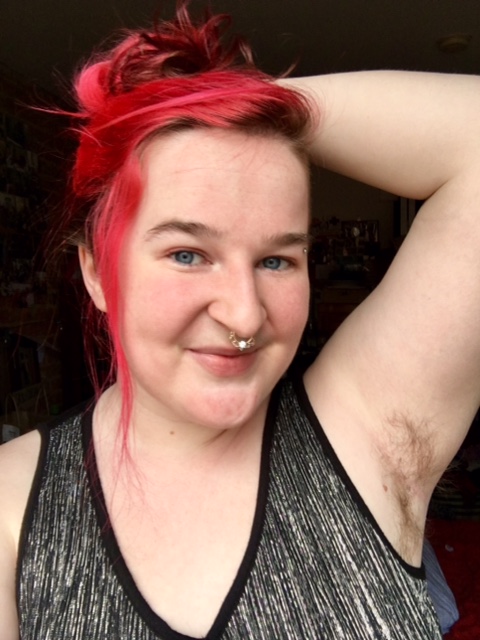
23% Of Women Don’t Shave Their Pits, Thanks Feminism!?
Everything is a study these days, including what millennial women do with their armpit hair. For 23 percent of them, the answer is “not much!” according to a study from Mintel. That’s up from only 5 percent of young women who reported not shaving in 2013. And companies are feeling the hit too — sales of hair removal products dropped five percent from 2015-16.
A few things are behind the trend, posits Roshida Khanom, associate director in beauty and personal care at Mintel, as quoted in The Telegraph. One is a shift toward products perceived as natural and good for the skin and body, which don’t include Nair apparently. “There’s also some pushing back against societal expectations of what women should look like,” she said.
Nobody loves fucking up the patriarchy and gender expectations like queer women and folks, and yet because queer and trans women and non-binary folks are pretty much always underrepresented in scientific research it is a safe bet that this study primarily reflects cis straight women, or at least is interpreted that way. I read four articles about this study and none of them mention queer folks. As a genderqueer human who stopped shaving my armpits mostly because I literally could not be bothered and was deeply inspired by the generations of dykes that came before me, I feel pretty strongly about the importance of pit hair in the queer community.
This is what Riese had to say when she shared the link in Slack: “Honestly I feel like we started it! I say this as someone who would never stop shaving her armpits personally but I’ve definitely noticed that it’s become increasingly prevalent. I know it’s a stereotype but I used to be surprised when femme of center folks didn’t shave and now I’m definitely not. As it becomes more popular to not shave, I feel like it’s become detached from gender identity/presentation within the queer community.”
So I did my own research, aka I texted a bunch of my queer and trans friends to ask them about their body hair. I mostly talked to folks who do not shave, but I really want to hear from y’all in the comments! What do you do with your pit hair? How does that choice connect with your gender, your other identities, cultural or family expectations?

Gloria
Gloria, Organizer: For me the decision to grow out my armpit hair has less to do with my gender identity and more with the decolonization of my intersectional identities as a queer mestiza. Yes, my bodily hair absolutely makes me feel super feminine and super sexy, but I think that came after years of work to decolonize beauty and femme standards. It’s about rejecting the idea that capitalism and colonization will not define natural beauty for me or for my community.
Maddie, former Staff Writer: I don’t shave my armpits because I have an amount of body hair that, when I did shave, was impossible to keep up with, and I felt self-conscious and itchy all the time and I felt like people would judge me for being bad at femininity or whatever. With my armpit hair growing wild and free, there’s no question that I’m making the choice to not shave and if people don’t like it, that’s 1000 percent their problem. Plus, my partner thinks it’s super sexy and that’s awesome.
Anna, Educator: I stopped shaving my armpits in college probably mostly out of laziness. I already never shaved my legs, though to be fair I didn’t have much visible hair there. My pits were another story — very thick, very visible, especially in the stubble stage. Even when I did shave I found myself keeping my arms down or specifically not wearing sleeveless clothes. I had the fortune of being in a community and social circle in college that was very queer and full of the ethos of self-love, so it was very easy to just leave behind this ritual that only brought me weird bumps and not very much more love for my body. If my pits were not really going to look pristine most of the time anyway, why bother? It’s been about five years since that time, and I truly have never looked back. I suppose I never meant the growing out of my (very dark and sometimes tangly) pits to be a statement, but I have had partners comment on how much they love it, femme friends telling me that it helped inspire acceptance of their own body hair, and a nice built-in filter on who’s down to hang with me, pits and all. I’m a queer East Asian Texan getting ready for sundress season, y’all.
Mey, Trans Editor: Trans women are treated way more harshly abt body hair than cis women. We often shave to help make sure people will see us as women rather than any other reason. So I think trans women are more likely to shave for that reason. It’s about survival not style or something the patriarchy said. I personally don’t have to shave them that often bc my hormones have made it so I barely grow any armpit hair at all.

Hilary
Hilary, Researcher and Organizer: I started shaving my armpits in middle school and stopped at the end of college — on the same timeline as first realizing I might be gay/fearing that my fellow middle schoolers would find out I was gay (must shave!! must do makeup!! must act straight!!) and finally coming publicly into my identity as an unapologetic non-binary trans person. Like wearing a bra, shaving was a compulsory gender practice that was really useful for a closeted queer/blossoming trans kid wanting to hide in plain site.
I stopped shaving my armpits somewhat on a whim, out of curiosity to see what my adult hair was like. It’s a bizarre and common experience among folks who were socialized female that we start shaving before our body hair has even fully grown in, so we don’t EVER see or touch or smell or live in our bodies with their hair unless we make the adult choice to grow it back out. The hair was scratchy and short at first — like it always is when it’s been shaved — but quickly became soft and comfortable. And then it became really, really important to me! I realized that my level of gender comfort skyrocketed up when I found the space to be gender noncomforming and femme at the same time.
Reclaiming my body hair by choosing to grow it ALL out was the first totally embodied choice I made around my trans-ness. As a non-binary femme person, completely uninterested in (/dysphoric within) masculinity, I felt really alienated by (mostly cis) narratives of transition and trans-ness because they assumed that my “destination” in transition was transmasculinity. Growing out my body hair as a reclamation of my body and my gender felt like a totally different kind of transition. It was a transition from unhappiness and alienation with my body to comfort and refuge (a much more expansive and hopefully accurate description of the billions of ways that trans folks transition in the world). And it allowed me to engage with my body in a new way — to ask my trans body what it wanted, how it wanted to function, how it wanted to move through the world, and to actually listen to the response.
Anyway, I fucking love my body hair — every last piece of it.
Wynn, Strategy Nerd: I quit shaving my armpits in late high school because I realized that I wasn’t trying to impress any men and shaving was a patriarchal construction. As it grew out and I began to question my gender, I found that having dark, longer hair gave me a masculine flair that I enjoyed and felt positive about.
Alaina, Staff Writer: For the most part I like [my hair] a lot! I think it’s cool watching my underarm hair grow. It’s been really cool realizing that the way I smell has a lot less to do with what deodorant I choose and more to do with how clean the hair is. I have always grown more body hair all over, and in the past it has made me feel self conscious and like I was in this body I didn’t ask for that was doing things I didn’t want it to do. But letting my underarm hair grow was a way to try out letting my hair go natural in a way that didn’t feel super public, and the confidence I gained from my hairy pits helped me be more confident with other hair and helped me stop trying to control what my body naturally does so often. Sometimes I might trim or tame it if it feels completely out of pocket, but for the most part, I love it. I love being wild and free and not connecting my aesthetic choices to how much body hair I’ve got.
Ok, community sound-off time! What do you do with your pits? Is that connected to your gender presentation, sexuality, or other identities? Let’s talk about it!
Writer’s note: My favorite thing about this roundtable is that Alaina and Maddie both used the phrase “wild and free,” so don’t hesitate to work that into your response.